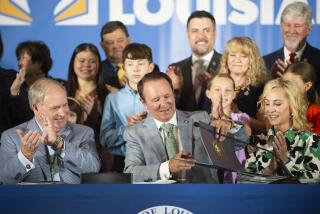Desert cross may lead to landmark church-state ruling
- Share via
WASHINGTON — A long-running dispute over a cross in the Mojave National Preserve in Southern California may give the Supreme Court a chance to shift the law on church-state separation.
Bush administration lawyers urged the justices last week to take up the case and to reverse a series of rulings that would “require the government to tear down a cross that has stood without incident for 70 years as a memorial to fallen service members.”
The appeal may be well timed. For two decades, the court has been closely divided over the presence of religious displays -- such as a Christmas tree, the Ten Commandments or a cross -- on public property.
Three years ago, the justices were evenly split in a pair of cases involving the Ten Commandments. They upheld, 5 to 4, a granite monument on the grounds of the Texas state capitol, but struck down a similar display inside a courthouse in Kentucky in another 5-4 ruling.
Soon afterward, Justice Sandra Day O’Connor, who said both displays were unconstitutional, retired. She was replaced by Justice Samuel A. Alito Jr.
“I think the court is poised for a major change as to the Establishment Clause,” said UC Irvine Law Dean Erwin Chemerinsky, referring to the 1st Amendment’s ban on “an establishment of religion.”
“Under Chief Justice [William H.] Rehnquist, there were four votes to say the Establishment Clause is violated only if the government literally establishes a church or coerces religious participation,” said Chemerinsky, who argued one of the Ten Commandments cases before the high court. “Now, I think there are five.”
The Mojave cross is in a remote location on federal land in San Bernardino County, near the border with Nevada. It dates to 1934, when the Veterans of Foreign Wars erected a wooden cross atop an outcropping known as Sunrise Rock.
Since then, the cross has been replaced several times. The current cross -- two white metal pipes welded together -- stands less than 8 feet high, but can be seen from Cima Road, about 11 miles south of Interstate 15.
The dispute over the cross arose in 1999, when the National Park Service considered and rejected a request to put a dome-shaped Buddhist shrine at a nearby trail head. Afterward, the park service said it planned to remove the cross.
But Congress intervened, blocking the agency from taking down the cross. In 2001, Frank Buono, a retired park service employee, sued the park service with the help of the American Civil Liberties Union chapter in Southern California. Buono, a Roman Catholic, alleged that the cross was an unconstitutional religious display on public land.
A federal judge and the U.S. 9th Circuit Court of Appeals ruled for Buono, saying the cross must be removed. But Congress intervened again and told the Interior Department to give the VFW the acre of land under the cross.
Undaunted, the 9th Circuit struck that down too, saying it “would leave a little doughnut hole of land with a cross in the midst of a vast federal preserve.” A “reasonable observer would perceive” this as a “government endorsement of religion,” the ruling said.
U.S. Solicitor General Gregory G. Garre urged the high court to review the 9th Circuit’s decision, saying it was wrong for at least two reasons: First, Buono, the park service employee, did not have standing to sue over the display of the cross, and second, Congress had solved the problem by giving the land to a private group.
Chief Justice John G. Roberts Jr. has been skeptical of according standing to litigants who cannot show that they have suffered an “actual injury” of some sort. A ruling in favor of the government on the standing issue could have a broad impact, as it would be hard for any objectors to prove that a religious symbol on government property had caused them a true injury.
The two sides also disagree over who is violating the essence of the 1st Amendment. The ACLU and the 9th Circuit said the park service should not show a “preference” for Christianity over Buddhism by allowing a symbol of one while forbidding the other. But the Bush administration’s lawyer countered by saying the court’s order to tear down the cross could be seen as “demonstrating hostility toward religion.”
Next month, ACLU lawyers will file a brief urging the court to turn away the government’s appeal. A decision on whether to take up the issue may come in December or January.
--
More to Read
Sign up for Essential California
The most important California stories and recommendations in your inbox every morning.
You may occasionally receive promotional content from the Los Angeles Times.











